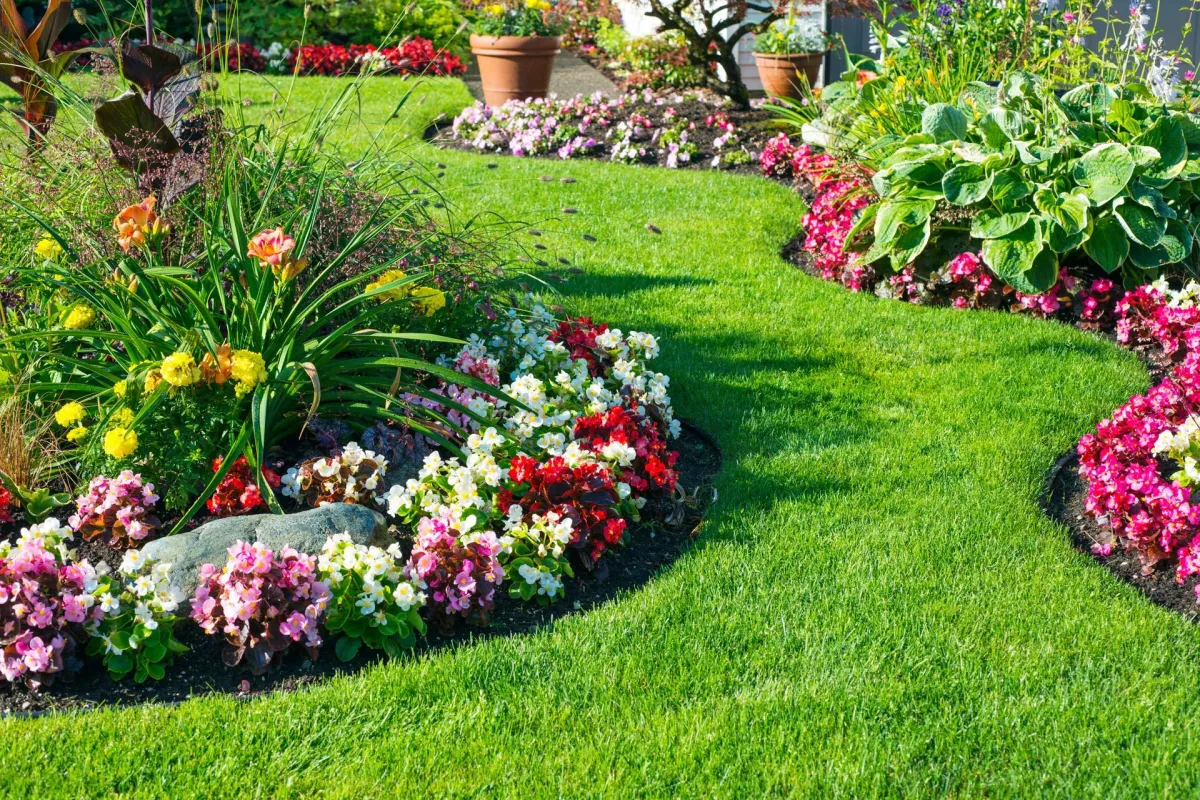Serving Orange County
Blog

Orange County Landscape Design Guide: Transform Your Home
Orange County's unique climate and beautiful surroundings offer countless opportunities for creating stunning outdoor spaces. Whether you have a small patio or expansive yard, good landscape design can transform your property into a personal paradise that reflects your lifestyle and increases your home's value.
The key to successful landscape design in Orange County is working with its Mediterranean climate, selecting appropriate native plants, and creating functional outdoor living spaces that complement your home's architecture. With the right approach, you can create a beautiful landscape that thrives year-round while conserving water and reducing maintenance.
Every great landscape starts with a solid plan. In this comprehensive guide, we'll walk you through everything you need to know about designing, implementing, and maintaining a beautiful landscape in Orange County. From selecting the right plants to installing efficient irrigation systems, you'll discover how to create an outdoor space that's both stunning and sustainable.
Understanding Orange County's Climate and Environment
Mediterranean Climate Considerations
Orange County enjoys a Mediterranean climate with warm, dry summers and mild, wet winters. This unique climate requires specific landscape planning to ensure your garden thrives throughout the year. When designing your landscape, consider the following:
Temperature patterns that range from cool coastal areas to warmer inland regions
Seasonal rainfall that concentrates mostly in winter months
Drought conditions that may affect plant choices and irrigation needs
Coastal influences that can bring morning fog and moderate temperatures
Soil Types and Preparation
Before planting, understand your soil type. Orange County soils vary from:
Sandy soils near the coast
Clay-heavy soils in some inland areas
Loam soils in select regions
Proper soil preparation is essential for healthy plants. Consider soil testing to determine pH levels and nutrient content. Many plants prefer well-draining soil, which may require amendments like compost or sand depending on your existing soil conditions.
Water Conservation Requirements
Orange County faces recurring drought conditions, making water conservation crucial. Your landscape design should include:
Drought-tolerant plants that thrive with minimal watering
Efficient drip irrigation systems that reduce water waste
Strategic hardscaping that minimizes water-dependent areas
Mulching to retain soil moisture and reduce evaporation
Planning Your Landscape Design
Assessing Your Space and Needs
Start by evaluating your outdoor space and how you want to use it:
Measure your yard and create a basic sketch
Note existing features like trees, structures, and slopes
Identify sunny and shady areas throughout the day
List your priorities (entertaining, gardening, play areas, etc.)
Consider views you want to enhance or screen
Creating Functional Zones
Effective landscape design divides your yard into practical zones:
Entertaining areas for gatherings and outdoor dining
Private retreats for relaxation
Play spaces for children or pets
Utility areas for storage or gardening
Transition zones that connect different areas
Selecting a Design Style
Choose a landscape style that complements your home and personal taste:
Mediterranean with drought-tolerant plants and terracotta features
Contemporary with clean lines and architectural plants
Cottage garden with colorful flowering plants
Japanese-inspired with tranquil water features and careful pruning
California native with indigenous plants and natural materials
Budgeting for Your Project
Plan your landscape budget carefully, considering:
Initial design and installation costs
Phasing options for larger projects
Long-term maintenance expenses
Water usage projections
Return on investment for your property value
Choosing the Right Plants for Orange County
Native Plants for Sustainable Landscapes
Native plants offer numerous benefits:
Adapted to local climate and soil conditions
Support local wildlife and pollinators
Generally require less water and maintenance
Create a sense of place unique to Southern California
Popular Orange County natives include:
California poppy
Toyon
Coastal sagebrush
Manzanita
Cleveland sage
Drought-Tolerant Plants and Xeriscaping
Embrace water-wise landscaping with these drought-resistant options:
Succulents and cacti that store water efficiently
Mediterranean herbs like rosemary and lavender
Ornamental grasses that add movement and texture
Australian natives like grevillea and bottlebrush
Privacy hedges that require minimal watering once established
Trees for Shade and Structure
Select appropriate trees for your Orange County landscape:
Coast live oak for native shade and wildlife habitat
Crape myrtle for colorful summer flowering
Olive trees for Mediterranean charm
California sycamore for large properties
Citrus trees for ornamental value and home harvests
Seasonal Color and Interest
Plan for year-round visual appeal with:
Spring-flowering perennials and bulbs
Summer-blooming drought-tolerant plants
Fall color from deciduous trees and late bloomers
Winter interest from evergreens and architectural plants
Hardscaping Elements for Orange County Gardens
Patios and Outdoor Living Spaces
Create inviting outdoor rooms with:
Permeable paving that allows water to seep through
Weather-resistant furniture suitable for the climate
Shade structures like pergolas or sail shades
Outdoor kitchens or BBQ areas for entertaining
Water Features and Conservation
Incorporate water thoughtfully:
Recirculating fountains that minimize water use
Dry creek beds that manage rainwater runoff
Rainwater harvesting systems for irrigation
Small reflecting pools for visual impact
Retaining Walls and Terracing
Address Orange County's varied topography with:
Properly engineered retaining walls for slopes
Terraced gardens that prevent erosion
Natural stone or block systems that complement your design
Planting pockets within walls for softening edges
Lighting for Safety and Ambiance
Extend your outdoor enjoyment with strategic lighting:
Path lights for safe navigation
Accent lighting to highlight landscape features
Energy-efficient LED systems
Solar options for sustainability
Irrigation and Water Management
Drip Irrigation Systems
Maximize water efficiency with:
Targeted drip systems that deliver water directly to plant roots
Zoned irrigation that groups plants with similar water needs
Smart controllers that adjust to weather conditions
Regular maintenance to prevent leaks and waste
Smart Watering Techniques
Adopt best practices for water conservation:
Water deeply but infrequently to encourage deep root growth
Water in early morning to reduce evaporation
Adjust seasonal watering schedules
Use mulch to retain soil moisture
Rainwater Harvesting
Capture natural precipitation with:
Rain barrels connected to downspouts
Bioswales that direct water to planting areas
Permeable surfaces that allow water to penetrate
Underground cisterns for larger properties
Maintaining Your Orange County Landscape
Seasonal Maintenance Calendar
Stay on top of landscape care with these seasonal tasks:
Spring:
Prune winter damage and shape plants
Apply mulch to retain moisture for summer
Plant warm-season annuals
Check irrigation systems
Summer:
Monitor water needs during hot periods
Deadhead flowering plants for continued blooms
Control weeds before they seed
Provide extra care for stressed plants
Fall:
Plant trees and shrubs to establish before summer
Adjust irrigation for cooler temperatures
Clean up fallen leaves
Prepare sensitive plants for winter
Winter:
Prune deciduous trees when dormant
Plan for spring gardens
Apply pre-emergent weed control
Check drainage during rainy periods
Professional Landscape Maintenance Services
Consider professional help for:
Regular garden maintenance on a weekly or monthly schedule
Seasonal cleanups and major pruning projects
Irrigation services and system repairs
Tree trimming and health assessments
Stump grinding and tree stump removal after tree removal
Sustainable Practices
Maintain your landscape responsibly:
Use organic fertilizers and pest controls
Compost yard waste when possible
Practice proper pruning techniques
Conserve water through appropriate irrigation
DIY vs. Professional Landscape Design
When to Hire a Professional
Consider professional design services when:
Your project is large or complex
You have difficult site conditions like slopes or drainage issues
You want a comprehensive plan that addresses all aspects
You need guidance on local regulations and permits
You want access to contractor networks for installation
Working with Landscape Professionals
Get the most from professional partnerships:
Be clear about your budget and priorities
Share inspiration photos and ideas
Ask for references and view past projects
Understand maintenance requirements upfront
Request detailed plans and specifications
DIY Design Tips
If tackling the project yourself:
Research thoroughly before beginning
Start with a detailed plan on paper
Begin with hardscaping elements
Install irrigation before planting
Plant larger specimens first, then fill in
Transforming Your Orange County Property
Curb Appeal Enhancements
Create a welcoming front yard with:
Clear, inviting pathways to your entrance
Privacy hedges that frame views and create boundaries
Low-maintenance plantings that look good year-round
Landscape lighting that enhances safety and aesthetics
Thoughtful color schemes that complement your home
Backyard Retreats
Design a private oasis that offers:
Multi-use spaces for various activities
Natural screening from neighbors
Comfortable seating areas
Shade for hot summer days
Features that reflect your personal interests
Small Space Solutions
Maximize limited areas with:
Vertical gardening techniques
Multi-purpose features
Container gardens that can be rearranged
Optical illusions that make spaces appear larger
Focused design that eliminates clutter
Creating Your Dream Orange County Landscape
Your landscape is a reflection of your lifestyle and values. By understanding Orange County's unique environment and following sound design principles, you can create an outdoor space that enhances your property and brings joy for years to come.
Remember that great landscapes evolve over time. Be patient as plants mature and don't be afraid to make adjustments as you learn what works best in your specific location. With proper planning, appropriate plant selection, and regular maintenance, your Orange County landscape will thrive and provide beauty in every season.
Ready to transform your outdoor space? Undefeated Landscape and Tree Service is your trusted partner for creating and maintaining stunning landscapes throughout Orange County. From expert design services to professional installation and ongoing care, we handle every aspect of your landscape needs with skill and dedication. Contact us today for a free consultation and take the first step toward the outdoor space you've always wanted!
© 2025 All Rights Reserved | Undefeated Landscape and Tree Service
